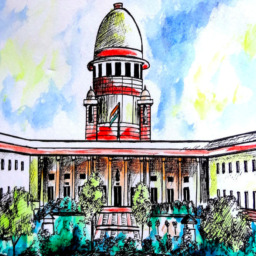FACTS
“Academy of General Education” was an educational institution which was founded by Dr TMA Pai in 1942 in Madras. But after the reorganisation of the states, the institution became a part of the state of Karnataka.
Later, several institutions were founded under the name of this institution including the “Manipal Engineering College Trust” for establishment and administration of “Manipal Institute of Technology” (second petitioner). The trust intended to promote the Konkani Language and to encourage the Konkani language speaking students. Later on, the trustees of the engineering college transferred the ownership of the college to the TMA Pai trust (first petitioner) which was formed in the memory of Dr TMA Pai.
The governor of Karnataka promulgated an ordinance called the “Karnataka Educational Institutions Ordinance, 1984” with the aim to prevent the educational institutions to charge excessive amounts in the name of fees. The state government also passed an order fixing the total intake of the students and also imposing a fixed percentage of seats as government seats.
The engineering college, owned by the TMA Pai trust fell into the category of Minority unaided private educational institution as it was not receiving any aid from the state.
Challenging the 1984 ordinance and the order of the state the petitioners filed a writ petition on the basis that the government’s regulation in the administration of the Minority educational institution infringes the rights of the minorities to establish and administer educational institutions.
ISSUES
There were several issues that came before the Apex court. The major issues were:
- Whether there is any provision under which one can establish and administer educational institution or not?
- How the minorities whether it is religious or linguistic will be decided- on the basis of the state or the whole country?
- Whether the government’s regulations on the minority aided or unaided institutions are violative of Article 30 or not?
- To what extent the government can impose restrictions on the administration of minority aided and unaided institutions?
LAWS
- Article 19(1)(g) of the Indian Constitution
- Article 29(2) of the Indian Constitution
- Article 30(1) of the Indian Constitution
- Article 26 of the Indian Constitution
RATIO DECIDENDI
Though the minorities have the right to establish and administer educational institutions of their choice under Article 30(1) of the constitution, it is not an absolute right, it is subject to Article 29(2).
PETITIONER’S ARGUMENT
The learned counsel on behalf of the minority education institutions contended that Constitution provides a fundamental right to the minorities to establish and administer educational institutions under Article 30. Hence, private educational institutions should have full autonomy in their administration & the state should not interfere or lay down conditions regarding nominations of the governing bodies of the private institutions, provisions regarding the admission of the students, the fixing of the fee structure and recruitment of teachers etc.
RESPONDENT’S ARGUMENT
The counsel in behalf of the state contended that as Article 30 is not an absolute right, Government can impose reasonable restrictions over the minority private education institutions for fair and better administration.
JUDGEMENT
In this case, the 11- judge bench had dealt with several issues regarding the autonomy of the private minority educational institutions.
- The Apex court held that all citizens have a right to establish and administer educational institutions under Article 19(1)(g), 26 and the minorities under Article 30 but these rights are not absolute rights.
- The court while dealing with the issue of how it would be decided who are minorities as there is no definition of “minorities” in the constitution, held that minorities (Religious& linguistic) would be decided on the basis of States.
- The court regarding the issue of whether state’s interference in the administration of the aided minority private educational institutions is violative of Article 30(1), held that the constitutional right under Article 30(1) to administer an educational institution of their choice does not necessarily militate against the state’s claim to insist that in order to grant aid the State can prescribe reasonable regulations to ensure the excellence of the institutions.
- In the case of unaided minority institutions, regulatory measures imposed by the state should be minimal. Recruitment of teaching & non-teaching staff, administrative control, fee structure would be beyond the Government’s control.
- In the case of aided minority institutions, Government can impose regulations but those should be reasonable restrictions & also government cannot interfere in the day-to-day administration of the aided minority private education institutions.
- In the case of admission, the minority unaided educational institutions can admit & select students of their choice but the procedure of selection must be fair and transparent.
Aided minority educational institutions also have the right to admit students belonging to their community on the basis of merit. But it must admit a reasonable number of non-minority students as well. The reasonable number would be decided by the respective states.
ANALYSIS
In the 21st century, private education has become an inseparable part of our education system. Privatization, Liberalization, Globalization & the government’s failure to provide adequate higher secondary education to its population has brought the concept of private education to light.
Here, the whole debacle had started with the issue of whether the government can interfere in the internal matters of the private (aided & unaided) institutions or not.
The government’s interference in the governing body of the institutions means that there can be political influence that can put unreasonable restrictions upon the educational institutions. Education aims to set one free from all the darkness but the government’s interference is not only putting shackles over the educational institutions but also putting restrictions on the quality of education.
The first issue was that how it would be decided that who minorities are as there was no reference regarding “minorities” in the constitution. The court while dealing with this issue relied upon the case “D.A.V. College v. State of Punjab” & held that minorities (Religious& linguistic) would be decided on the basis of States even though “Education” is now a part of the Concurrent List.
Another issue before the court was whether the government can regulate the nomination of the members in governing bodies, admission of the students, recruitment of teaching and non-teaching staff of the private minority institutions or not.
Article 30(1) of the Constitution provides rights to the minorities to establish and administer educational institutions “of their choice”. But if the government puts unreasonable restrictions on the minority educational institutions while giving financial aid or affiliation, then the sole purpose of such institutions will be defeated.
While dealing with this issue the court relied upon various cases like-
St. Stephen’s College v. University of Delhi, State of Madras v. Champakam Dorairajan, State of Bombay v. Bombay Education Society, Kerala Education Bill, 1957 etc. and held that the right under Article 30(1) is not so absolute as to prevent the Government from making any regulation whatsoever.
I do agree with the Apex court’s judgement regarding the government’s regulations in the minority private educational institutions. In one hand, there should be reasonable restrictions imposed by the state over these institutions for a better and fair education system. The minority, as well as the non-minority students, should also be provided with the opportunity to receive education from private institutions.
On the other hand, it is also important that the restrictions imposed by the government should be reasonable and the government should not interfere with the day-to-day administration of the institutions which can mitigate the “minority” nature of the institutions.
CONCLUSION
Article 29 and Article 30-(Cultural & Educational Rights) plays a major role in interpreting the extent of the rights of minorities to establish and administer educational institutions.
T.M.A Pai Foundation v. State of Karnataka[1] is a landmark judgement that has given answers to several questions regarding the minorities’ rights & government’s regulations in the administration of educational institutions. This case has given clarity on how Article 29(2) applies to Article 30(1).
Author(s) Name: Rumela Biswas (Christ University, Delhi NCR)
References:
[1](2002) 8 SCC 481
















